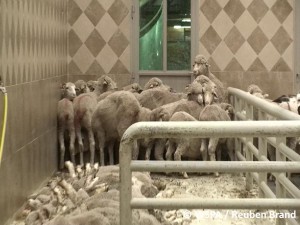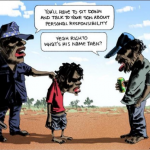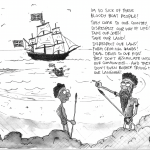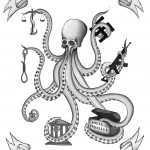My following article regarding the live export trade from Australia to the Middle East was published today at the Window Dressers Arms – it was also re-published at The Daily Bludge, where it made headlines on the front page.

Live export is not only cruelly exporting Australian animals; it is crippling local industry and exporting our jobs. Writes Reuben Brand
After conducting numerous investigations at livestock markets and abattoirs throughout the Middle East, I returned to Australia with hours of footage and hundreds of photographs that document the inhumane treatment these animals endure at the receiving end of the live export trade.
These investigations were launched by Sydney Lord Mayor Clover Moore during a forum at Parliament House in Sydney, where I spoke alongside representatives from the World Society for the Protection of Animals (WSPA) and the Australasian Meat Industry Employees Union (AMIEU).
Since my return I have been working closely with local meat processors and Australian meat workers who are now doing it tough due to the fact that there is simply not enough livestock to support local industry because they are all being shipped offshore.
The myths about why live export is important are many; the most common are as follows:
Myth: “Many people do not have the luxury of home refrigeration, and supermarkets are often inaccessible and unaffordable to those living in regional villages.”
Fact: Australia predominately exports to the Gulf region which, despite industry claims, is a very prosperous region for obvious reasons. Oil. The idea of “a lack of refrigeration” is not only an extremely ignorant and un-researched claim, but it is highly culturally offensive. People in the Middle East are not Bedouins living in tents, during my time living in the region I saw more luxury vehicles and high-rises than I see in Sydney or any other “developed” country. Supermarkets are very plentiful and very accessible, all of which stock a huge variety of chilled meat – with Australian chilled meat as the cheapest and most sort after of all.
Did I mention that Dubai has air-conditioned public bus stops and indoor ski slopes? But apparently no one has a fridge. Go figure.
Myth: “The supply of live animals is also important for religious and cultural reasons.”
Fact: Yes, there are religious celebrations that require live animals – only two times a year. Eid al Fitr, which marks the end of Ramadan and Eid al Adha, that marks the end of the pilgrimage to Mecca. Only twice a year – but we continue to send live animals 365 days a year.
I spoke to one of the young migrant workers at a livestock market in the region who told me he does not get paid by the local livestock company for his services. Rather, they give him a small amount of food and let him sleep in the holding pens with the animals. He has a Diploma of Associate Engineering and this is what he gets. This kind of cheap labour comes at a very high price and is all the more reason for Australia put an end to a trade that treats both humans and animals so appallingly.
The solid fact of the matter is that the live export trade is exporting Australian jobs (to countries that in some cases don’t even pay their employees) and is crippling our meat processing industry.
During a recent trip to Townsville and Dinmore in Queensland, I interviewed meat workers who are now either unemployed or have had their shifts cut right back and are trying to survive on government handouts.
In Townsville I watched as truck after truck, loaded with cattle, drove straight past the local abattoir. One local meat worker, who is now unemployed, told me that the export vessel docked in the harbour was not only exporting cattle, it was exporting the jobs of approximately 250 people who had just been stood down.
“Nobody is working today and yet there is a boat with thousands of cattle leaving. Thousands! You know, that’s a whole months’ worth of work for us,” she said.
According to Grant Courtney, President of the AMIEU, 40,000 people have lost their jobs and 150 processing plants have been shut down due to the live export trade – over 700 of these job losses have happened in the past six months alone.
“I can’t understand why the Government is sticking its head in the sand when thousands of Australian jobs are being lost due to this trade,” he said.
Another man I spoke to who lost his job at the local abattoir is now struggling just to keep his family afloat. His fiancé, who is also pregnant, has now had to go back into the workforce to try to support their growing family.
With no money for food or bills, no fuel in the car, debt collectors breathing down his neck and relying on donations to survive, life is becoming increasingly tough he bravely told me.
“Lately it’s been getting pretty bad… we’ve even had to go down to the local community centre and grab food vouchers… You start to appreciate things like that when people donate food and money vouchers so you can live.”
Shift cut backs and job losses at the processing plant in Dinmore now have workers pondering the future of the Australian meat processing industry. As one woman told me, if the Dinmore plant is suffering, which is one of the biggest in Australia, then she can’t see hope for the survival of any of the smaller ones.
“Every boat of cattle that leave this county, leave the Australian worker and I know what it feels like without work…it’s no good saying that the live cattle export doesn’t contribute, it certainly does. Because it’s just got worse and worse,” she said.
With a daughter who has a terminal illness and needs a surgery that could save her life, this woman courageously sat and gave a first-hand account of how the live export trade is affecting her life and many others who are now in the same boat.
Andrew Martell, a sheep farmer from central Western NSW, attended the live export forum at Parliament House last month and made some points during Q and A time – he also told the room that he receives the same amount of money for his sheep regardless whether he sells them to exporters or local industry.
So why on Earth would you want to send sheep offshore to be slaughtered and transported inhumanely when you could have it all done here and create much needed jobs in the process?
It is an absurd idea to think that all people in the Middle East buy their daily meat from a wet market – can you imagine how long it would take just to buy a single steak? Local supermarkets and butcher shops operate on a cuts and carcass trade where the outcome for the consumer would remain the same with a chilled meat trade.
Independent research, conducted by ACIL Tasman, shows that a sheep processed domestically is worth 20 per cent more to the Australian economy than one exported live.
According to the Australian live export industry this trade contributes $1.8 billion to the economy, so by using their own figures, if we phase out the live export trade and implement a chilled meat trade for export we could have an industry that injects $2.16 billion into our economy. Not to mention the huge impact it will have on Australian jobs.
A chilled meat trade is not only a sustainable alternative but is also extremely lucrative for all involved, be it farmer, processor or meat worker.
To view a video of Reuben’s investigation in the Middle East please click here
To view interviews of meat workers please click here

























